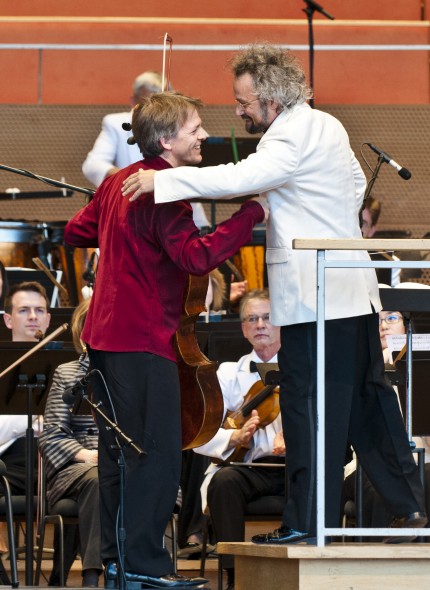Dvořák and Elgar open Grant Park Music Festival in superb style

For classical fans in Chicago, the principal rite of summer took place Wednesday night with the opening of the Grant Park Music Festival at the Pritzker Pavilion.
This 78th season of the lakefront festival is marking the 50th anniversary of the Grant Park Chorus, which will be spotlighted in several programs, including two new works commissioned for the occasion, the first of which, by Michael Gandolfi, will premiere Friday night.
But Wednesday it was Carlos Kalmar and the Grant Park Orchestra with guest cellist Alban Gerhardt in a Romantic program well suited to al fresco music-making. And, unlike last year’s opening night with Berlioz drowned out by torrential rain, Wednesday’s low 60-degree temperature and clear skies seemed beneficent by comparison.
Alban Gerhardt has been among the most popular guest artists of the Kalmar era, and the German cellist showed once again his considerable gifts in Sir Edward Elgar’s Cello Concerto.
The soloist made no concession to the outdoor milieu, playing with a daringly wide dynamic range. Yet this was above all, an organic, deeply felt performance, with Gerhart’s playing consistently compelling and idiomatic. The cadenza was lightly articulated yet impressive in its quiet bravura. In the Adagio, Gerhardt brought a melting lyricism to Elgar’s inward expression, his refined tone and well-calibrated vibrato heartfelt without veering over to the sentimental. In the closing movement Gerhardt provided biting attacks and bristling virtuosity yet underlined the yearning quality in his hushed, glowing passage before the emphatic coda.
A superb solo performance with Kalmar an equally inspired partner. Once again the conductor showed himself a terrific Elgarian, keeping a deft balance between the English composer’s melancholy rumination and dynamic vigor. Perhaps Kalmar might favor us with one of Elgar’s symphonies next season.
The festival’s principal conductor is one of those rare podium figures who never seems to do any repertoire badly, yet there are some composers in whose music Kalmar really shines, and Dvořák is clearly one of them.
From the rich, burnished cellos of the opening bars, Wednesday’s performance of the Bohemian composer’s Symphony No. 8 was ideally judged, the dynamism and nostalgic lyricism held in a fine, flexible balance.
Few works are as well suited to open-air concerts as this symphony, with its woodwind birdcalls intermittently complemented by the real thing. The climaxes of the opening movement had firm impact and sonic punch. Kalmar brought out the contrasts of the Adagio superbly, finding a surprisingly bleak darkness in the introspective movement with the songlike middle section set with a light-footed lilt.
The Allegretto went with an aptly gracious balletic lift and the finale provided a thrilling payoff with crackling brilliance in the final bars. Some violin ensemble lapses and a brass smudge in the finale’s opening fanfare apart, the Grant Park musicians delivered their usual blend of polish and virtuosity, with particular kudos for Mary Stolper’s first-class flute playing.
The evening led off with Elgar’s Pomp and Circumstance March No. 1. Divorced from its usual stateside accompaniment to commencement exercises, one can appreciate the craft and keen contrasts of Elgar’s wonderful miniature. Kalmar led a vital and energetic reading with the celebrated trio theme aptly nobilmente, without going over the top.
The frenzied knob-twiddling that usually accompanies opening night of the festival was happily absent Wednesday with the amplification level and mix sounding close to ideal from the very first notes.
The Grant Park Music Festvial continues 6:30 p.m. Friday and 7:30 p.m. Saturday with Carlos Kalmar leading the Grant Park Orchestra and Chorus in Liszt’s Les Preludes, Schuman’s A Free Song, Handel’s Music for the Royal Fireworks and the world premiere of Michael Gandolfi’s Only Converge: An Exaltation of Place. Grantparkmusicfestival.com
Posted in Uncategorized




